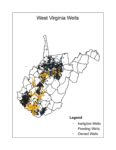Is it a good idea to take ownership of a well to keep free gas for your house, or not?
WVSORO does not recommend having ownership of an old gas well transferred to the surface owner in order to keep free gas for a home. Owning a well means that when the well needs to be plugged, it is you who will be responsible if the State acts. Eventually the well will play out and not even produce enough gas for you to use, though that could take decades. In the meantime it might fill up with water or paraffin and need to be restored by having the well “swabbed” or otherwise serviced by a company that does that. But eventually it will finally die.
Here is our page generally on what you should do if you learn there is a proposal to plug a well on your surface land. (Note: You will get an official notice that gives you some rights. And they may want you to sign off saying you have no objection to their plans. And you can be watchful to press them to do it right, particularly the surface reclamation. All of this may give you some leverage to ask the operator, if they are going to plug the well, to pay for you to have a propane tank, propane appliances and one full tank of propane. We know of at least one, and maybe more, companies that have done that. And the Public Service Commission sometimes requires companies with “field tap” customers on gathering/small transmission gas lines to do this. Unfortunately propane costs probably twice as much as natural gas, and you may not have been as good with insulating your house when your heating gas was free.)
According to the West Virginia Code, the well should be plugged if it has not produced for 12 months and has no approved “bona fide future use”. (The state code calls this being “abandoned’ though that is a misnomer if the well still has a responsible operator and has not yet become orphaned by the operator going out of business). Usually using the gas from a well for a residence counts as producing. But if it no longer does even that, then the law requires it to be plugged by the”operator”. (However, to be candid, as this is written, State enforcement of that requirement is virtually nonexistent — there are 12,000 such idle unplugged wells.) Importantly, if the well starts leaking or polluting the surface or groundwater, State required plugging could be soon and expensive! Never the less, there are people who decide to take ownership of gas wells for short-term reasons despite the at least long-term risks.
We strongly urge, before considering taking ownership of the well, that you are sure to inspect the well and make sure it is not leaking out on the surface, it is not leaking gas (pure methane is odorless but methane detectors are cheap online), and it is not looking in bad shape generally. Surface pipe and joints can be fixed relatively easily if they are leaking. Sometimes leaks between inner and outer wellhead casing can be fixed, but it takes someone with experience with wells and the right tools (and those wells are more likely to leak later). Leaks of gas or fluids coming up out of the ground surrounding the well are a big problem and we highly recommend passing on owning these wells.
If the well was drilled after 1980 there is a better chance it will not leak and that it will be relatively easy to plug — but even then, plugging costs many thousands of dollars more than the $5000 bonding/financial assurance you will need to post with the State Department of Environmental Protection/Office of Oil and Gas (DEP/OOG) to take ownership of the well. Also make sure that the well is producing plenty more pressure than you need right now so you know that it will last long enough for your free gas cost savings to justify the plugging requirement cost risk. You need at least 6 to 8 oz pressure to run your home appliances and some suggest having an extra large diameter pipe as it nears your home so it will have a reserve of volume when big appliances kick on. You may be able to check the rate at which the well’s production is declining by looking up the well’s API number on the West Virginia Geological Survey website. (Note though that a repeating 5 5 5 or 9 9 9 may mean the operator is not reporting the actual volume, just that it is only being used for free gas.) And always have a gas detector in your home. Methane itself is odorless and only some wells produce other gases that have an odor you could detect if there was a leak.
If the current operator is planning to plug a well, it will cost the operator probably more than $25,000 to plug the well. So don’t you buy/pay for the well! Tell the operator to give to you $5000 WITH the well, and then you will take it off their hands. You may need that $5000 cash as a form of bond/financial assurance (more on that later) to become the required State recognized “operator” of the well before you can have its ownership transferred to you. So tell them you need that $5000 to take over the well (because you cannot afford to make annual payments for a surety bond/financial assurance etc. (again more on that later)) and save them their additional $20,000+ cost to plug it.
How do I post the bond/financial assurance and get the well transferred to me?
Here are the steps: (Note all forms are on this website of the Department of environmental Protection / Office of Oil and Gas. The current operator may help you with all of this since they probably want to get rid of the well and already know at least some of the ropes.)
First, you will need to register as an official well “operator” owner of wells by giving the DEP/OOG a filled out Form OP-1, the “Operator Registration”,. This is a simple one-page form with name and contact information, the name of a “designated agent” (you), and the type of bond/financial assurance.
Second, you and the current operator/owner will have to turn in the signed and notarized well transfer form: OP-77. There is a $50 bond transfer fee.
Third, it is important to note that in order to own the well (become its “operator” according to state law) you have to either post a bond or have other financial assurance of compliance with the laws. The amount required either way for a single well is $5,000.
Of the various options for doing this, the easiest, simplest and cheapest way is to give a cashier’s check made out to the W.Va. Department of Environmental Protection in the amount of $5,000. Along with that you have to fill out and file the additional DEP Office of Oil and Gas Form OP-2, the “Request to Invest” your money with the WV Consolidated Investment Fund. This is a one-page form. You will also need to turn in an IRS Taxpayer ID form W-9 so the State will not withhold some of your interest money and send it to the Internal Revenue Service. The DEP will invest your money in the WV Consolidated Investment Fund and they pay you interest annually on the $5,000. Usually the interest rate is 5%, but sometimes better. The State has a good credit rating, and its investment fund should earn a very competitive rate. There are no fees of any kind involved in this arrangement. (If you do not have that kind of money you may have to borrow it from the bank and pay it off over time, hopefully not at an interest rate that is too much higher than the interest rate the state will pay on your money. We do not know if borrowing the money would be cheaper than the costs of the other options below.)
The other options for t his third step all have more difficulties.
You can assign a $5,000 bank Certificate of Deposit (CD) of yours for the bond/financial assurance and keep the interest it generates. But CDs have various term lengths, which means you regularly have to renew the CDs. The state isn’t authorized to act on renewals. The CD is assigned to the State, and the State is authorized to charge against the CD for failure to perform requirements. This also keeps the bank from liquidating the CD without a release from the State. Here is the link to the Certificate of Deposit/assignment form the DEP/OOG wants you to use with the bank. We do not know if every bank will agree to everything in that form.
You can also get a $5,000 letter of credit from a bank and connect with the State about that. Here are the instructions from the State. And here is the bond form for using a letter of credit. The bank will want a fee. So instead of earning interest, you’d be paying a fee. This is a hassle, and the bank will probably want the $5,000 fully collateralized — meaning you could lose what you use as collateral in the (unlikely) event the State ever goes after the bank. But you may not have $5,000 cash (already or borrowed) although you have property worth $5,000 that the bank would take as collateral. So this might work for you. Small banks in oil and gas counties may be more amenable to this.
Some insurance agencies will sell you an actual, true “surety bond” that you can use. Not all insurance companies do this. We contacted Chancellor Insurance in Parkersburg and they said that they did. The application might require you to submit copies of your tax returns, financial statements, credit rating and other documents. It would be a challenge, and if you were successful, the fee would be likely not be cheap, $250 a year as this is written. Here is the bond form. Here are the DEP/OOG/s instructions for filling out the form.
(Note: Some people recommend, instead of owning the well personally, to form a separate corporate entity to own (be the “Operator” of) the well. This is sometimes referred to as a “Special Purpose Entity” (“SPE”).
Still have questions?
If you have read this and still have questions contact WVSORO and we will try to answer your questions.




